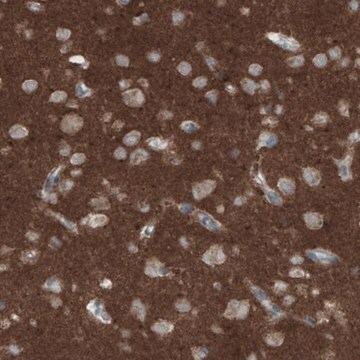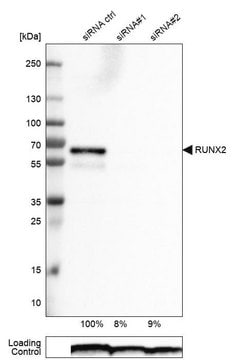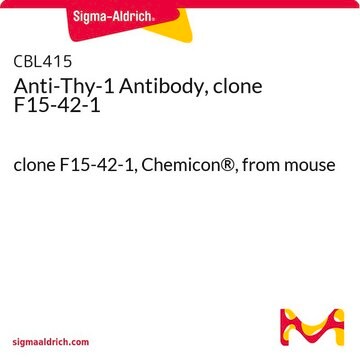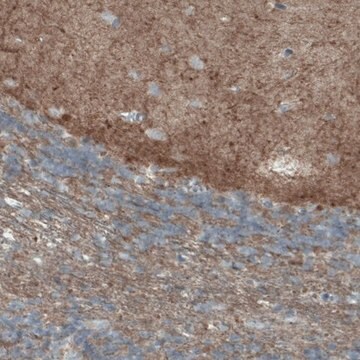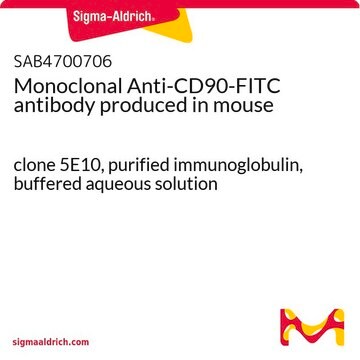推荐产品
生物源
mouse
共軛
unconjugated
抗體表格
purified from hybridoma cell culture
抗體產品種類
primary antibodies
無性繁殖
TH350, monoclonal
形狀
buffered aqueous solution
分子量
antigen ~27 kDa
物種活性
mouse, human, rat
濃度
~1.0 mg/mL
技術
ELISA: suitable
flow cytometry: 20-40 μg/test using A549 cells.
immunohistochemistry: suitable
western blot: 2.0-4.0 μg/mL using NT2 total cell extracts.
UniProt登錄號
運輸包裝
dry ice
儲存溫度
−20°C
目標翻譯後修改
unmodified
基因資訊
human ... THY1(7070)
相关类别
一般說明
THY-1在人成纤维细胞、神经元细胞、血液干细胞和内皮细胞以及鼠类T细胞等多种细胞类型中表达。
THY1(小鼠IgG1亚型)单克隆抗体,来自于免疫BALB/c小鼠骨髓瘤细胞和脾细胞相互融合而产生的TH350杂交瘤细胞,用于小鼠免疫的合成肽与匙孔血蓝蛋白(KLH)偶联并且对应于人THY1的N末端序列。THY1单克隆抗体可识别人、大鼠和小鼠Thy-1。
Thy-1细胞表面抗原(THY1)是在成体细胞、间充质基质细胞和癌细胞的细胞膜上表达的糖蛋白。它的分子量约为25-37kDa。编码THY1的基因位于人染色体11q23.3上。
Thy-1细胞表面抗原(THY1)是在成体细胞、间充质基质细胞和癌细胞的细胞膜上表达的糖蛋白。它的分子量约为25-37kDa。编码THY1的基因位于人染色体11q23.3上。
特異性
THY1单克隆抗体可识别人、大鼠和小鼠Thy-1。
免疫原
该合成肽与KLH偶联,其对应于人THY1的N末端序列。
應用
小鼠抗THY1单克隆抗体可用于:
- 免疫印迹
- 流式细胞术
- 免疫荧光
生化/生理作用
THY-1还参与抑制神经突增生、凋亡信号传导、白细胞和黑色素瘤细胞的粘附和迁移以及成纤维细胞的增殖和迁移。该蛋白在细胞-细胞和细胞-基质之间的相互作用中起介导作用。Thy-1是鉴定局部和循环肝癌干细胞的细胞表面标志物。该蛋白的表达可通过启动子区的甲基化表观遗传机制调节,Thy-1的下调与更多的浸润性/转移性临床表型出现有关。
Thy-1细胞表面抗原(THY1)作用于T细胞的活化、突触的神经递质释放、星形胶质细胞的粘附增强、伤口愈合、纤维形成和肿瘤抑制。它在细胞迁移和细胞骨架重组中也具有重要作用。
外觀
0.01M 磷酸缓冲盐溶液,pH 7.4,含 15mM 叠氮化钠。
儲存和穩定性
若需延长储存时间,可将溶液分装并在-20°C下冷冻。不建议反复冻融或存放在“无霜”冰箱中。如果长期储存时出现轻微浑浊,请在使用前通过离心澄清溶液。若工作稀释样品在12小时内未使用完,则应丢弃。
免責聲明
除非我们的产品目录或产品附带的其他公司文档另有说明,否则我们的产品仅供研究使用,不得用于任何其他目的,包括但不限于未经授权的商业用途、体外诊断用途、离体或体内治疗用途或任何类型的消费或应用于人类或动物。
Not finding the right product?
Try our 产品选型工具.
儲存類別代碼
10 - Combustible liquids
水污染物質分類(WGK)
WGK 2
閃點(°F)
Not applicable
閃點(°C)
Not applicable
Tanya A Rege et al.
Biochimica et biophysica acta, 1763(10), 991-999 (2006-09-26)
Thy-1 is a 25-37 kDa glycosylphosphatidylinositol (GPI)-anchored protein involved in T cell activation, neurite outgrowth, apoptosis, tumor suppression, wound healing, and fibrosis. To mediate these diverse effects, Thy-1 participates in multiple signaling cascades. In this review, we discuss Thy-1 signaling
Thomas H Barker et al.
Experimental cell research, 295(2), 488-496 (2004-04-20)
The precise biological role of Thy-1, a glycophosphatidyl-inositol (GPI)-linked cell surface glycoprotein in non-caveolar lipid raft microdomains, remains enigmatic. Evidence suggests that Thy-1 affects intracellular signaling through src-family protein kinases, and modulates adhesive and migratory events, such as thymocyte adhesion
Zhen Fan Yang et al.
Cancer cell, 13(2), 153-166 (2008-02-05)
This study characterized cancer stem cells (CSCs) in hepatocellular carcinoma (HCC) cell lines, tumor specimens, and blood samples. The CD90+ cells, but not the CD90(-) cells, from HCC cell lines displayed tumorigenic capacity. All the tumor specimens and 91.6% of
Physical linkage of the fragile site FRA11B and a Jacobsen Syndrome chromosome deletion breakpoint in 11q23. 3
Jones C, et al.
Human Molecular Genetics, 3, 2123-2130 (1994)
Naoya Hoshikawa et al.
Molecular therapy. Nucleic acids, 19, 199-207 (2019-12-17)
Osteoarthritis (OA) is the most prevalent joint disorder associated with severe chronic pain. Although synovial inflammation is well correlated with pain severity, the molecular mechanism responsible for OA pain remains unclear. Here, we show that extracellular miR-21 released from synovial
我们的科学家团队拥有各种研究领域经验,包括生命科学、材料科学、化学合成、色谱、分析及许多其他领域.
联系技术服务部门
